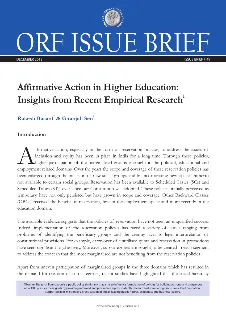Affirmative action, especially in the form of reservation policies, to address the issues of inclusion and equity has been in place in India for a long time. Through these policies, higher participation of the marginalised groups is sought in the political, educational and employment related domains. Over the years the scope and coverage of these reservation policies has been enlarged through the inclusion of new social groups and by incorporating new ‘spaces’ hitherto not available to certain social groups. Reservation has been available to Scheduled Castes (SCs) and Scheduled Tribes (STs) ever since our Constitution was adopted. These policies, initially perceived as temporary, have not only persisted but have grown in scope and coverage. Other Backward Classes (OBCs) received the benefit of reservation, first in the employment space and more recently in the education domain.
The available evidence suggests that the policies of reservation have not been an unqualified success. Indeed, implementation of the reservation policies has faced a variety of issues ranging from problems of identifying the beneficiary groups and the creamy layer to legal interpretation of constitutional provisions. For example, carry-over of unutilised quota and reservation in promotions have seen significant legal activity. Moreover, sub-categories are sought to be created in each segment to address the concern that the most marginalised are not benefiting from the reservation policies.
Apart from uneven participation of marginalised groups in the three domains which has resulted in the demand for creation of sub-categories, recent studies have highlighted that the social hierarchy and conditions which formed the basis of affirmative action are not stable and are undergoing a change in India.
Given the above, this Issue Brief suggests that we need to rethink the scope and coverage of affirmative action (read reservation). While it focuses on higher education, similar methods and ideas can be potentially extended to the spaces of employment and politics.
The views expressed above belong to the author(s). ORF research and analyses now available on Telegram! Click here to access our curated content — blogs, longforms and interviews.





 PREV
PREV


